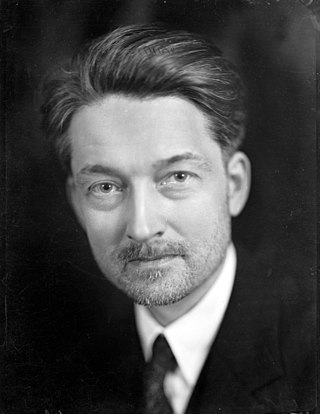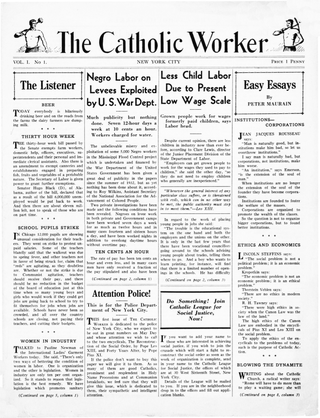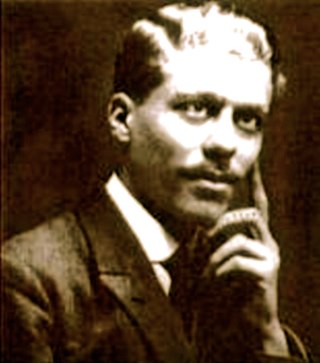Distributism is an economic theory asserting that the world's productive assets should be widely owned rather than concentrated. Developed in the late 19th and early 20th centuries, distributism was based upon Catholic social teaching principles, especially those of Pope Leo XIII in his encyclical Rerum novarum (1891) and Pope Pius XI in Quadragesimo anno (1931). It has influenced Anglo Christian Democratic movements, and has been recognized as one of many influences on the social market economy.
Anarcho-pacifism, also referred to as anarchist pacifism and pacifist anarchism, is an anarchist school of thought that advocates for the use of peaceful, non-violent forms of resistance in the struggle for social change. Anarcho-pacifism rejects the principle of violence which is seen as a form of power and therefore as contradictory to key anarchist ideals such as the rejection of hierarchy and dominance. Many anarcho-pacifists are also Christian anarchists, who reject war and the use of violence.

In politics, integralism, integrationism or integrism is an interpretation of Catholic social teaching that argues the principle that the Catholic faith should be the basis of public law and public policy within civil society, wherever the preponderance of Catholics within that society makes this possible. Integralism is anti-pluralist, seeking the Catholic faith to be dominant in civil and religious matters. Integralists uphold the 1864 definition of Pope Pius IX in Quanta cura that the religious neutrality of the civil power cannot be embraced as an ideal situation and the doctrine of Leo XIII in Immortale Dei on the religious obligations of states. In December 1965, the Second Vatican Council approved and Pope Paul VI promulgated the document Dignitatis humanae–the Council's "Declaration on Religious Freedom"–which states that it "leaves untouched traditional Catholic doctrine on the moral duty of men and societies toward the true religion and toward the one Church of Christ". However, they have simultaneously declared "that the human person has a right to religious freedom," a move that some traditionalist Catholics such as Archbishop Marcel Lefebvre, the founder of the Society of St. Pius X, have argued is at odds with previous doctrinal pronouncements.

Dorothy Day was an American journalist, social activist and anarchist who, after a bohemian youth, became a Catholic without abandoning her social activism. She was perhaps the best-known political radical among American Catholics.

Christian democracy is a political ideology inspired by Christian social teaching to respond to the challenges of contemporary society and politics.
Christian anarchism is a Christian movement in political theology that claims anarchism is inherent in Christianity and the Gospels. It is grounded in the belief that there is only one source of authority to which Christians are ultimately answerable—the authority of God as embodied in the teachings of Jesus. It therefore rejects the idea that human governments have ultimate authority over human societies. Christian anarchists denounce the state, believing it is violent, deceitful and idolatrous.

Jacques Maritain was a French Catholic philosopher. Raised as a Protestant, he was agnostic before converting to Catholicism in 1906. An author of more than 60 books, he helped to revive Thomas Aquinas for modern times, and was influential in the development and drafting of the Universal Declaration of Human Rights. Pope Paul VI presented his "Message to Men of Thought and of Science" at the close of Vatican II to Maritain, his long-time friend and mentor. The same pope had seriously considered making him a lay cardinal, but Maritain rejected it. Maritain's interest and works spanned many aspects of philosophy, including aesthetics, political theory, philosophy of science, metaphysics, the nature of education, liturgy and ecclesiology.

Ammon Ashford Hennacy was an American Christian pacifist, anarchist, Wobbly, social activist, and member of the Catholic Worker Movement. He established the Joe Hill House of Hospitality in Salt Lake City, Utah, and practiced tax resistance.
Arthur Joseph Penty was an English architect and writer on guild socialism and distributism. He was first a Fabian socialist, and follower of Victorian thinkers William Morris and John Ruskin. He is generally credited with the formulation of a Christian socialist form of the medieval guild, as an alternative basis for economic life.

The Catholic Worker Movement is a collection of autonomous communities founded by Dorothy Day and Peter Maurin in the United States in 1933. Its aim is to "live in accordance with the justice and charity of Jesus Christ". One of its guiding principles is hospitality towards those on the margin of society, based on the principles of communitarianism and personalism. To this end, the movement claims over 240 local Catholic Worker communities providing social services. Each house has a different mission, going about the work of social justice in its own way, suited to its local region.

The Catholic Worker is a newspaper based in New York City. It is published seven times a year by the flagship Catholic Worker community in New York City. It focuses on themes such as social justice, Catholic social teaching, pacifism, and activism. As of May 2023, it has about 26,000 mail subscribers. Despite transitioning towards decentralized distribution, specifics on circulation remain limited. Notably, the publication has refrained from offering a digital edition. Established in 1933 as a platform for the Catholic Worker Movement by Dorothy Day and Peter Maurin, the newspaper operates without formal leadership following the passing of its founders and is currently managed by editors Amanda Daloisio and Joanne Kennedy.

Personalism is an intellectual stance that emphasizes the importance of human persons. Personalism exists in many different versions, and this makes it somewhat difficult to define as a philosophical and theological movement. Friedrich Schleiermacher first used the term personalism in print in 1799. One can trace the concept back to earlier thinkers in various parts of the world.

Emmanuel Mounier was a French philosopher, theologian, teacher and essayist.

Commonweal is a liberal Catholic journal of opinion, edited and managed by lay people, headquartered in New York City. It is the oldest independent Catholic journal of opinion in the United States.

The Personalist Labor Revolutionary Party, often simply called the Cần Lao Party, was a Vietnamese political party, formed in the early 1950s by the President of South Vietnam Ngô Đình Diệm and his brother and adviser Ngô Đình Nhu. Based on mass-organizations and secret networks as effective instruments, the party played a considerable role in creating a political groundwork for Diệm's power and helped him to control all political activities in South Vietnam. The doctrine of the party was ostensibly based on Ngô Đình Nhu's Person Dignity Theory and Emmanuel Mounier's Personalism.
A Catholic lay association, also referred to as Catholic Congress, is an association of lay Catholics aiming to discuss certain political or social issues from a Catholic perspective.
The non-conformists of the 1930s were groups and individuals during the inter-war period in France that were seeking new solutions to face the political, economical and social crisis. The name was coined in 1969 by the historian Jean-Louis Loubet del Bayle to describe a movement which revolved around Emmanuel Mounier's personalism. They attempted to find a "third (communitarian) alternative" between socialism and capitalism, and opposed both liberalism/parliamentarism/democracy and fascism.
Edward Ingram Watkin was an English Catholic philosopher, pacifist and writer.
Thomas C. Cornell was an American journalist and a peace activist against the Vietnam War and the Iraq War. He was an associate editor of the Catholic Worker and a deacon in the Catholic Church.

The Committee of Catholics to Fight Anti-Semitism was an American Catholic anti-racist organization formed in May 1939, partially in response to the 1938 announcement of Pope Pius XI that "it is not possible for Christians to take part in anti-Semitism". It was supported by many prominent Catholics, including members of the Catholic Worker Movement, among them Dorothy Day.















